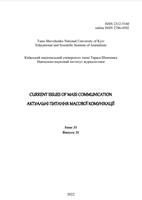Theoretical framework media and political economy of communication
Theoretical framework media and political economy of communication
Author(s): José Antonio Villalobos-LópezSubject(s): Media studies, Electronic information storage and retrieval, Theory of Communication, Crowd Psychology: Mass phenomena and political interactions, ICT Information and Communications Technologies
Published by: Інститут журналістики Київського національного університету імені Тараса Шевченка
Keywords: mass media; information media; communication; communication research and policy;
Summary/Abstract: This article is presented with a deductive method orientation, with a paradigm of hermeneutic order, based on experience, carried out under an exclusively qualitative approach, which will serve as a scaffold for a next study of digital media. Communications are a means or mechanism of organization for coexistence in society. The political economy of communication has its origin in the theories or critical approaches of Frankfurt and cultural studies, which has analyzed the role of the owners or concessionaires of large radio and television corporations, highlighting the bias they have given to the dissemination of information and culture, orienting it towards the defense of their ideology or their commercial interests, thus leading to the alienation and training of large masses of audience. In these modern times, the massification of the media is the result of technological convergences, where three disciplines or spaces are at work: information technology, telecommunications and the Internet, which is the axis or center of the new communications ecosystem. Social networks allow feedback between sender and receiver of news, transforming the unidirectional communication process provided by conventional media.
Journal: Актуальні питання масової комунікації
- Issue Year: 2022
- Issue No: 31
- Page Range: 40-53
- Page Count: 14
- Language: English

